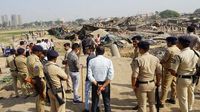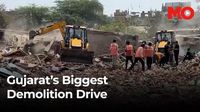On April 30, 2025, the Amdavad Municipal Corporation (AMC) announced the successful clearance of significant encroachments near Chandola Lake in Ahmedabad, a move that has sparked both support and controversy. The operation, which commenced on April 29, involved a massive eviction drive that saw the demolition of approximately 4,000 unauthorized structures, including around 1,000 permanent homes and 3,000 temporary huts. In just two days, the AMC reclaimed approximately 1.5 lakh square meters of government land, which had long been a hub for illegal activities, according to local authorities.
Municipal Commissioner Banchha Nidhi Pani stated, "More than 2,000 residential encroachments will be removed, and it will vacate more than 1.25 lakh square meters of land." This demolition was part of a broader effort to restore order and safety in the area, which has been plagued by allegations of criminal activities, including drug trafficking and human trafficking.
The eviction drive received backing from Gujarat's Minister of State for Home Affairs, Harsh Sanghavi, who emphasized the necessity of the operation. He said, "We have demolished the area where four illegal Bangladeshi nationals, affiliated with Al-Qaeda, were arrested. We have demolished the area where large drug cartels were nabbed, and we have demolished the area where young Muslim girls were being pushed into prostitution by illegal Bangladeshis." Sanghavi further asserted that every inch of state government land would be cleared, underscoring the government's commitment to public security.
However, the operation has drawn criticism from civil rights groups and affected residents, many of whom claim to have valid identification documents such as Aadhaar cards and ration cards. Mirza Ikram Baig, a member of the civil rights group APCR, argued that the demolitions were unjust, stating, "The only thing is that they were all Muslims. Even those deemed illegal are still in the Crime Branch and being interrogated. Why did the authorities punish the rest for it?"
As the demolition began, many residents rushed to gather their belongings, fearing the impending bulldozers. The AMC deployed over 50 bulldozers and dumpers, supported by around 2,000 police personnel, to carry out the operation. The scale of the drive was unprecedented, marking the largest demolition effort in over a decade in Ahmedabad.
In a related legal development, the Gujarat High Court rejected a plea from residents seeking to halt the demolition. The court's decision was influenced by a Supreme Court ruling that clarified that unauthorized structures cannot be legitimized simply due to the passage of time or the inaction of authorities. The High Court noted that Chandola Lake is a notified water body, and no construction can be permitted in such areas.
The court's oral order stated, "This is not a case where the petitioners have been discriminated against. Though the right to life includes the right to shelter, the petitioners cannot claim a vested right for resettlement and rehabilitation on the very premises… which is a water body and government land." This ruling has left many residents feeling vulnerable and without recourse.
In the wake of the demolitions, the government has faced scrutiny over its treatment of the residents. The petitioners argued that they had not received proper notice before the demolitions began and claimed that they had lived in the area for many years, thus entitled to resettlement under state policies. However, the court found these claims unsubstantiated, noting that the petitioners failed to provide sufficient documentation to prove their long-term occupancy.
As the dust settles from the massive eviction, the implications of the operation extend beyond the physical displacement of residents. The actions taken by the AMC and the state government have raised questions about the balance between public safety and the rights of individuals, particularly in marginalized communities. Critics argue that the focus on illegal immigrants has led to a broader crackdown that disproportionately affects vulnerable populations.
In a broader context, the demolitions at Chandola Lake come against the backdrop of heightened security concerns following recent terrorist attacks in India, including a tragic incident in Pahalgam that resulted in the deaths of 26 individuals. This atmosphere of fear has seemingly justified aggressive government actions aimed at restoring order, yet it has also ignited a debate about the methods employed to achieve these ends.
The situation at Chandola Lake highlights the complex interplay between law enforcement, community rights, and the historical significance of the area. Once the site of Mahatma Gandhi's Salt Satyagraha movement, the region is rich in history and cultural importance. Many residents, who have built their lives and communities there, now face an uncertain future.
As authorities continue their efforts to clear encroachments, the question remains: how will the government address the needs of those displaced? Will there be adequate support for resettlement, or will the focus remain solely on eradicating illegal structures? The answers to these questions will shape the narrative of this ongoing saga and the future of Chandola Lake and its residents.
In conclusion, the AMC's demolition drive at Chandola Lake is emblematic of the broader tensions surrounding urban development, public safety, and individual rights. As the government asserts its authority in the name of public order, the voices of those affected must not be silenced. The path forward requires a careful balance—one that honors the rights of residents while ensuring the safety and integrity of the community as a whole.





